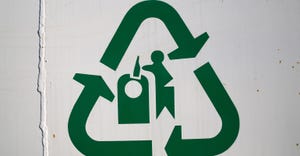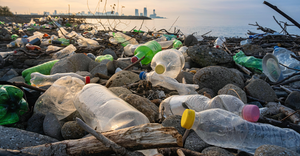Morrigan was recently named a Waste360 40 Under 40 award recipient.
How many times has McKenna Morrigan heard that “multifamily residents don’t care about recycling?” Too many to count. In fact, she has heard all the myths and misconceptions around multifamily recycling programs, but she doesn’t believe them. What she does believe is that these programs can succeed.
Morrigan, a senior associate with Cascadia Consulting Group, works with public and private sector clients to rethink how they design, implement and evaluate these programs for multifamily residents.
Morrigan, who has more than 10 years of industry experience and a passion for her work, was recently named a Waste360 40 Under 40 award recipient. Waste360 spoke to Morrigan about what led her to the waste management industry and the framework she has helped to develop to enhance and improve outcomes for multifamily recycling programs.
Waste360: What is the process you go through to assess a client’s problem and create a solution?
McKenna Morrigan: I often work with cities that are interested in improving outcomes in apartment recycling and composting. We start by understanding what they’re doing currently. We put together an assessment of their current state and a plan for improvement. Often, these are pilot projects that they are interested in testing, so there is an evaluation component to figure out to assess if what is being piloted works well. The team often will do outreach and technical assistance to property managers and apartment residents, focused on improving service and outcomes, and then evaluate the programs.
I also work on waste characterization studies. Recently, I have been collaborating with colleagues on developing a new methodology for using waste characterization cart-level capture rate studies to assess programs that are designed to affect resident behavior—whether it is around recycling, composting or contamination reduction—and evaluate quantitatively whether those programs are making a difference. I have done that most recently with The Recycling Partnership. We led the evaluation of three programs that they piloted in Denver, Chicago and Atlanta last year.
Waste360: What led you to the waste management industry?
McKenna Morrigan: I originally thought that I wanted to work in international development, particularly in China. I minored in Chinese, and after college, I went to China to teach English. I volunteered with a rural development organization, and that is where I had a realization that I wanted to work in this industry because the pollution was so bad it made my nose bleed. So much of it was coming from coal-fired power plants that were generating electricity for factories making stuff for American consumers—stuff that we use and throw away so quickly without thinking about it.
I realized that if I really wanted to make a difference for the community that I was living in in China, I needed to focus a lot closer to home than I had realized, to work on helping my own country consume thoughtfully, conserve resources and generate less waste. That’s what led me back to school, and, ultimately, where I am now.
Waste360: What do you wish people in your community understood about waste?
McKenna Morrigan: One of the areas that I focus a lot on is around apartment recycling. I have had the opportunity to speak nationally about what we have found in our research and what success we have observed in implementing apartment recycling programs and improving their outcomes. One of the things that I want to take this opportunity of national exposure to highlight is just how important it is that we do a better job of serving apartment residents and improving apartment recycling programs.
As I started working in this field, I noticed that there are a lot of misconceptions about why multifamily recycling programs have poor outcomes compared to single family programs. I think a lot of folks think that it’s sort of a lost cause and that it’s not possible to see really successful programs in a multifamily setting, but the truth is, from my perspective at least, there has been a real lack of investment in apartment recycling infrastructure and programs. A lot of times, it’s left up to property managers to set up services and educate residents.
I have done a lot of research locally, nationally and globally on apartment recycling programs, and I found that if you want parity in outcomes, you need parity in investment. Communities should be investing as much per household in education and program support for apartment residents as they do for single family homes. That typically hasn’t been the case, and apartment residents haven’t been reached in the same way and to the same degree, so there is a lot of ground to make up. That is something that I have been able to work with communities on—deepening those investments and trying to address some of that lack of investment in the past.
My team has done a lot of research, and we have also designed, implemented and evaluated
programs. We have reached hundreds of buildings, tens of thousands of residents. We have offices in the Bay Area and Seattle, and we have worked extensively in both of those regions to develop a framework for the essential elements of program success in a multifamily setting. We have found that when you implement that, you can see really successful outcomes, participation and material quality, all of the things that you might expect to see in a strong curbside recycling program. Those things are possible to achieve in an apartment setting with the right infrastructure, and the right outreach and engagement.
Waste360: What are the “Four C’s of Infrastructure” that you helped to develop?
McKenna Morrigan: That is a framework that can help guide what a recycling or composting infrastructure should look like. The four “C’s” are convenience, clarity, capacity and color. Convenience means recycling containers should be paired with landfill containers at every point of collection in the building.
Clarity means you should have large image-based decals on all containers and clear informational signs posted at every point of collection. Capacity means that recycling capacity should comprise 50 percent of weekly service volume or at least 20 gallons per unit per week.
Recycling, landfill and organics containers should be consistently and meaningfully color-coded. Preferably, recycling containers should be blue, and the color coding scheme in an apartment setting should mirror what residents see in other places in their community. Reinforcing behavior with simple color-coding is a really effective way to reinforce participation.
Waste360: What would you say to a young person who might be considering a career in the waste industry?
McKenna Morrigan: I am so inspired by the other young people I meet in this industry. There is so much room for creativity and innovation. We are at an inflection point as an industry, and we need new ideas and creative strategies to keep this important work going.
About the Author(s)
You May Also Like


